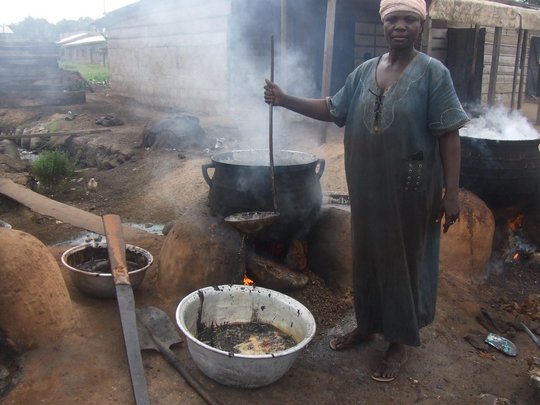Palm kernel oil benefits more women
 Palm Kernel oil production, an indigenous activity in traditional Ashanti, has become a lucrative business for many women in Kumasi in recent times even in the face of the constraints that come with the production process.
Palm Kernel oil production, an indigenous activity in traditional Ashanti, has become a lucrative business for many women in Kumasi in recent times even in the face of the constraints that come with the production process.
Advertisement
Inadequate investment funds, lack of modern production machinery and dwindling raw material base are some of the problems militating against the women in achieving optimum benefits from the business.
Nonetheless, many of them believe that the returns are encouraging even though there is still room for improvement.
In a number of communities, especially the peripheries, women have created large production centres where they undertake their business.
Last Tuesday, I visited one of the production sites at Atasomanso, where about 50 women were engaged in their individual processing.
The production line encompasses a combination of manpower and mechanical processes and as I watched the women do their own thing, it dawned on me that given the needed support, especially from the government Ghanaian women could work to bring positivity to their lives.
Many of the women at the Atasomanso production centre did not have formal education.
In fact, of all the women I spoke to, only one, Felicia Paali, a mother of four, had the benefit of basic education.
Stressing how palm kernel production has helped her over the past five years, Felicia, who is a widow, said: “Through this business, I have managed to send all my four children to school; the eldest is now in senior high school.”
“My brother, without what I am doing I don’t know what I would have done to survive and more so to send the four children to school,” Madam Paali said.
The produce has ready market with cosmetics and soap manufacturers as the biggest buyers.
Palm kernel oil is also commonly used in the preparation of convenient foods not only in the rural areas but in many homes in the urban areas.
Currently, a gallon containing 45 beer bottles of palm kernel oil at the Atasomanso centre costs an average of GH¢35. At the peak it costs GH¢45.
The oil is derived from the kernel of the oil palm, which is grown in abundance in the Ashanti Region.
Palm kernel oil, according to a nutritionist, contains no cholesterol, which makes it healthy to consume.
The production process starts from the gathering of the kernels to the cracking, milling and sieving, and moves through to cooking before the oil is extracted.
At Atasomanso, the production process goes through three stages that require the use of machines. These are cracking, milling and sieving.
Unfortunately, only two women have sieving machines, one of which is currently not working. The machines were manufactured by artisans at the Kumasi magazine.
Those who do not have money to buy the sieving machine adopt the traditional method which is time consuming and also prolongs the production process.
Travelling long distances to purchase the palm kernel is also a source of concern to the women.
“Apart from travelling to long places to get the raw material, we also move from house to house in the city to buy the palm kernel and transport them to our business point,” 70-year-old Madam Nafisa Isifu told me.
“We cannot continue to do this work virtually manually as it increases production time and we appeal to the authorities to help us get the needed machines to work with,” she said.
The reliance on firewood in the production is also outmoded and has been a drain on the finances of the women.
Aside the oil produced from palm kernels, the shells are also used as dust palliative on unpaved roads, and the women have been selling them to make money.
By Kwame Asare Boadu/Ghana



